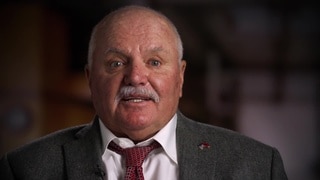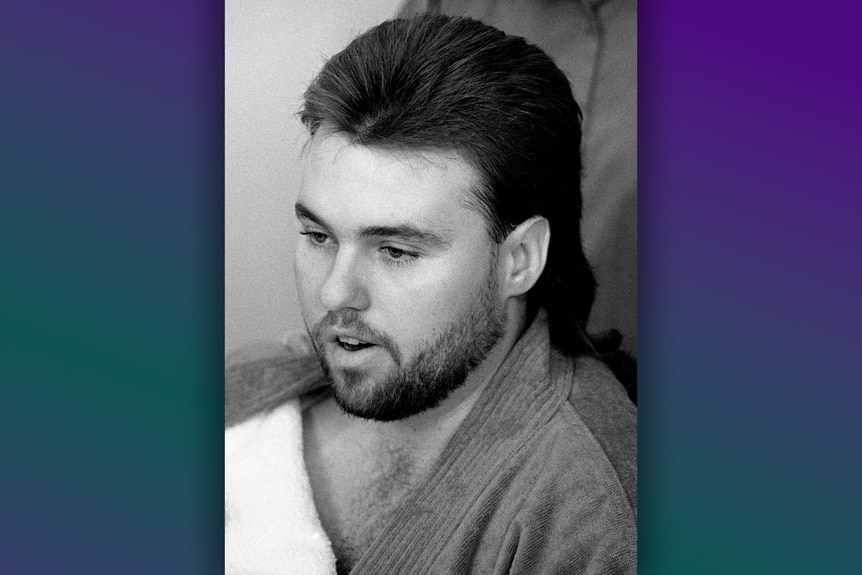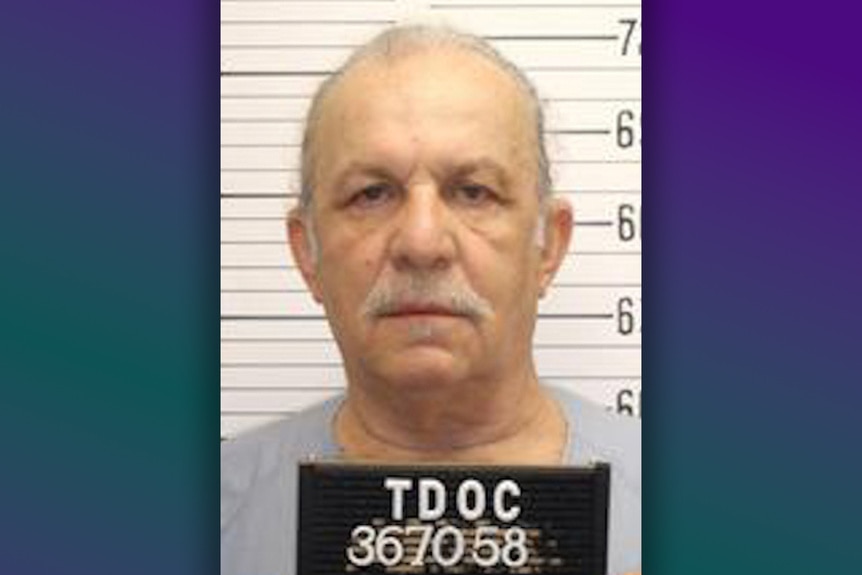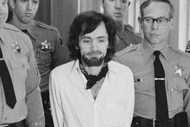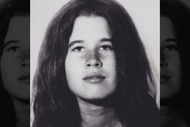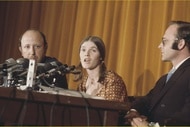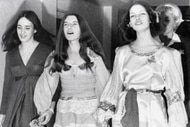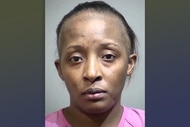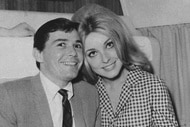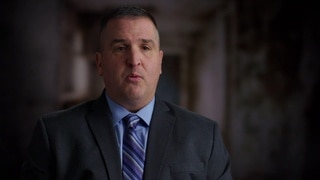Create a free profile to get unlimited access to exclusive videos, breaking news, sweepstakes, and more!
Nashville Music Row Insider's Murder Investigation Uncovers "Payola Scheme"
A hit man and his alleged conspirator feared that an honest chart director could expose their dirty business.
At 11 p.m. on March 9, 1989 , law enforcement in Nashville raced to Evergreen Records after shots were fired outside the Music Row studio.
“One of the patrol officers had never seen anything like it,” author Jesse Sublett told Sins of the South, airing Sundays at 7/6c on Oxygen. “There was so much blood.”
Sammy Sadler, 21, was rushed to the hospital with life-threatening injuries. The other victim, Kevin Hughes, 23, was dead from gunshots to his head.
For more in true crime:
Famous TikTok Star Convicted of Murdering Estranged Wife and Her Friend
Former Husband of Convicted Hoaxer Sherri Papini Speaks Out: "I Was Wrong"
Days After Getting Married, Man Dies in Wife's Arms While Defending Her from Serial Killer Intruder
Who were the shooting victims?
Witnesses reported seeing Sadler stumble out of a parked car. Onlookers also saw Hughes running away and being chased by a gunman.
The suspect was described as being stocky, dressed in black, and having a limp. Both victims still had their belongings on them, so a robbery motive looked unlikely.
Detectives learned that Hughes worked as a chart director at Cash Box magazine, a music industry trade publication.
Raised in small-town Illinois, Hughes “kind of reminded me of Winnie the Pooh,” said his friend and former coworker Sue Thackrey. “He was really a lovable kind of guy.”
Hughes loved music. He left Belmont University in Nashville his senior year to work full time as Cash Box’s chart director. That meant he was in charge of ranking music based on popularity.
“This was his dream job,” retired investigator Myra Langlois told Sins of the South.
Sadler, investigators discovered, was an aspiring singer/songwriter and Hughes’ friend.
“He wanted to be that guy at the top of the charts … and make money doing what he loves,” said former journalist Kathleen Jacob.
Witnesses reported seeing Sadler stumble out of a parked car. Onlookers also saw Hughes running away and being chased by a gunman.
The suspect was described as being stocky, dressed in black, and having a limp. Both victims still had their belongings on them, so a robbery motive looked unlikely.
Detectives learned that Hughes worked as a chart director at Cash Box magazine, a music industry trade publication.
Raised in small-town Illinois, Hughes “kind of reminded me of Winnie the Pooh,” said his friend and former coworker Sue Thackrey. “He was really a lovable kind of guy.”
Hughes loved music. He left Belmont University in Nashville his senior year to work full time as Cash Box’s chart director. That meant he was in charge of ranking music based on popularity.
“This was his dream job,” retired investigator Myra Langlois told Sins of the South.
Sadler, investigators discovered, was an aspiring singer/songwriter and Hughes’ friend.
“He wanted to be that guy at the top of the charts … and make money doing what he loves,” said former journalist Kathleen Jacob.
Sammy Sadler's version of events
About 24 hours after being shot, Sadler woke up from surgeries and to the fact that Hughes was dead. Despite Sadler’s physical and emotional trauma, detectives sought to get as much information from him as quickly as possible.
Sadler told investigators that he and Hughes had gone out to dinner after work and stopped by Evergreen Records to make a phone call. It was the studio where Sadler was recording his first album, FoxNews.com reported.
After Sadler finished the phone conversation, he and Hughes walked to Hughes’ car, according to now-retired Nashville Police Department Detective Bill Pridemore. “Kevin had gotten into the car and Sammy was opening the car and getting into it when the shooter approached and shot Sammy,” Pridemore said.
“Kevin jumped out of the car and started running,” Pridemore continued. “He got shot once while he was running, fell down and the shooter … fired two more rounds.”
Sadler said he didn’t get a good look at the masked gunman’s face.
Sammy Sadler Briefly a Person of Interest
For Sadler, an ambitious young country artist, music charts are a key part of success. Was he somehow tied to Hughes’ slaying?
“We just didn’t feel like he was being completely honest with us,” said Pridemore. “I suspected him of being involved, either directly or indirectly.”
But Sadler denied any involvement. If he had set up Kevin’s murder and used his own shooting as a cover, the grave injuries he suffered made it a very risky plan.
What's more, Sadler agreed to take a polygraph test and passed it. Detectives became convinced that Sadler was an innocent victim.
Chuck Dixon and Tony D'Antonio Questioned
Detectives learned that Hughes had problems at work and was considering quitting his dream job and leaving Nashville. “Kevin’s parents knew that he was worried and anxious, and they knew it was about his job,” said Sublett.
To get more details about Hughes’ work issues, detectives questioned Cash Box employees. They also questioned Chuck Dixon, an influential independent music promoter often seen at Cash Box.
Dixon seemed mystified about the shooting, according to Sins of the South. Richard “Tony” D’Antonio, the former chart director at Cash Box magazine and one of Dixon’s friends, said that he was similarly in the dark.
Although investigators had gotten tips about “disputes concerning the chart ratings,” Cash Box employees were too scared to talk about it, said Pridemore.
A fresh lead turns up in separate cold case
Hughes’ murder case went cold. Then, in 1994, Pridemore was contacted by the Georgia Bureau of Investigation.
Pridemore learned that an undercover informant told a GBI agent that D’Antonio bought an unregistered gun on March 9, 1989, the day of the shooting. It was a solid lead. But the undercover source was off-limits until the case he was on was resolved.
As detectives worked the case, they learned about what Jacob called “a payola scheme” at Cash Box throughout the 1980s.
“Rumors were that Dixon and Tony D’Antonio were both getting paid to place songs higher up on charts,” Jacob said.
The shady system was in place when Hughes became chart director in 1987. Had Hughes run afoul of the men allegedly behind the reported con?
Break in the case comes in 2002
Investigators believed that they’d found a motive for Hughes’ murder. But they lacked evidence to prove it. In 2002, Steve Daniel, the GBI informant, was no longer undercover.
Daniel told detectives that back in the late ’80s D’Antonio “bought a gun from him on March 9, 1989,” said Pridemore.
“In 1993, Steve Daniel heard about the murder of Kevin Hughes on Crime Stoppers,” added Pridemore.
Daniel realized that D’Antonio matched the description of the shooter who’d reportedly run with a limp and told Pridemore that D’Antonio “runs like a duck.”
The investigator also learned that D’Antonio test-fired the gun before he bought it in a remote wooded area, which turned out to be a popular place to shoot. Pridemore collected numerous shells from the area in hopes of matching one to the evidence from the Hughes crime scene.
Against long odds, he got lucky. A firearms analyst found “a perfect match” in the casings collected from the woods. “He said, ‘The bullet came out of Kevin’s head,’” said Pridemore.
Tony D'Antonio arrested for murder
In July 2002, D'Antonio was arrested in Las Vegas, where he worked as a casino pit boss. He was charged with murder and attempted murder.
In 2002, Langlois had cracked the chart-fixing scam at Cash Box magazine. She arrested local music promoter Robert Metzger for fraud.
Looking for leverage, Metzger shared information. He told her that Dixon, who died of cancer in 2001, and D’Antonio were behind Hughes’ murder.
“According to Robert Metzger, he saw an argument between Chuck Dixon and Kevin Hughes a week or so before Kevin was killed,” Langlois said. “Chuck was trying to give him money. Kevin Hughes was refusing the money.”
Dixon and D’Antonio feared that Hughes could blow the whistle on their dirty business, so D’Antonio took on the hit.
D’Antonio’s trial began in 2003. Metzger, Daniel, and Sadler testified for the prosecution. D’Antonio had claimed that at the time of the shooting that he was home with his wife, said Sublett. Now divorced, his ex-wife told the court that he didn’t come home until after 3 a.m. that night, said Sublett.
On September 4, 2003, D’Antonio was found guilty of murder and attempted murder. He was sentenced to life in prison, where he died in 2014.
To learn more about the “Death in Music City,” watch Sins of the South, airing Sundays at 7/6c on Oxygen.
